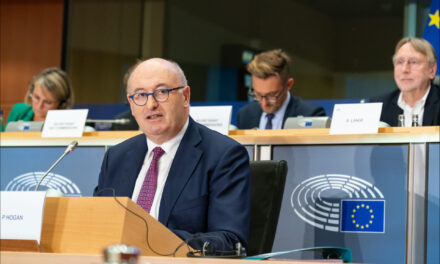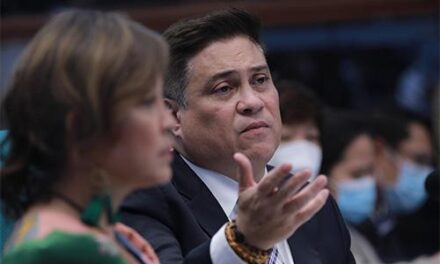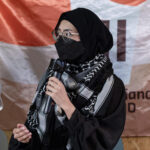New Delhi, July 30:
The Coordination Committee of the National Kisan Panchayat, representing nearly 75 per cent of India’s farming community, after a careful perusal of the framework proposal put up by the General Council of the World Trade Organisation (WTO) at Geneva today, strongly urges the Government of India to reject the draft.
The National Kisan Panchayat feels that the draft proposals, if accepted, will devastate the livelihoods security of 650 million Indian farmers already reeling under an unprecedented fury of severe drought and ravaging floods. The WTO framework will strike a death-knell for the Indian farming community and play havoc with country’s food security.
"India should therefore rise to the occasion and demonstrate to the world that it will not succumb to any political pressure, and will protect and stand by its farming community," Mr Atul Anjaan, Mr Devinder Sharma and Mr Krishan Bir Chowdhary, the three members of the coordination committee, said in a joint press statement.
The framework should have given a clear message that all subsidies in agriculture that the developed countries provide (close to US $ 320 billion), will be eliminated within a fixed timeframe for ensuring fair trade. India’s Commerce Minister, Mr Kamal Nath, had been very clearly and loudly making this point. But unfortunately, we find that the revised draft is quite rhetoric in expressing the concerns on domestic support without making any definite commitment. Moreover, the framework has provided for the inclusion of Blue Box subsidies, despite vehement opposition from India and other developing countries, an indication that the WTO has gone by the direction provided by the United States and the European Union.
The July 30 draft has acknowledged "Green Box criteria will be reviewed with a view to ensuring that Green Box measures have no, or at most minimal, trade-distorting effects or effects on production." But the draft falls short of outlining the measures to discipline the subsidies under Green Box or for phasing out of such subsidies within a definite timeframe. It has in fact added an additional burden of Blue Box that the developing countries will now have to bear the burden of.
Since India has already phased out or removed its quantitative restrictions to meet the obligations of the Agreement on Agriculture without any reciprocal reduction in agricultural subsidies by the developed countries, there is no justification for India to accept anything before the subsidies in the rich countries are brought down or reduced to the same level as prescribed by the WTO. "We will not accept anything that compromises on the subsidy issue," the statement warned.
The National Kisan Panchayat feels that the developed countries have refused to follow the rules of the trade and their domestic support has been on an upswing. "They are now demanding more market access in the developing countries with a promise to phase out domestic support, as if they are doing a favour to us," the coordination committee says, and demands that India must stand firm on its position on farm subsidies, and any softening of its position will mean betrayal of the country’s economic interests.
The proposed enlargement of the Blue Box will help the developed countries (especially the US) to shift their huge subsidies from Amber and Green boxes under various pretexts and thus legitimise their present level of support to agriculture. The move now is to avoid or prevent circumvention of agreement by saying that product-specific AMS (Aggregate Maximum Support) should be capped at their respective average levels during a ‘historical basis’ to be agreed. But the term ‘historical basis’ is not clarified as to whether it is pre or post Uruguay Round or pre or post Doha.
By shifting the subsidies granted through the notorious Farm Bill 2002, the US can now justify its counter-cyclical payments to farmers and such payments under the Blue Box, and thereby escape reduction commitments.
We therefore ask as to how such an agreement will help Indian farmers?
As Kamal Nath said at Geneva, our farmers can compete with the US farmers but not the US government.
We also find that the WTO is now trying to dangle a carrot before India and Indonesia through the inclusion of special products. This is also applicable to developed countries. In reality, the special protection on sensitive products given to the developed countries can be used as a mechanism to deny market access to the products from the developing world. As many as 25-30 per cent of the European Union’s tariff lines (under TRQ) can be brought under ‘sensitive products’ and thereby protected. Similarly in Japan 30 per cent of tariff lines can be brought under ‘sensitive products’. So while the developed countries are finding cleverly-guarded measures to protect their agricultural production, India cannot just sign on the dotted line under pressure.
"No protection of special products can help protect India’s sensitivity in agriculture unless the huge farm subsidies in the developed countries are first removed."
Sd/ Sd/ Sd/
Atul Kumar Anjaan Devinder Sharma Krishan Bir Chowdhary
National Kisan Panchayat comprises All India Kisan Sabha, Bharat Krishak Samaj, Bharti Kisan Union, Bharti Khet Mazdoor Union, Andhra Pradesh Rayota Sangha, Punjab Kisan Sabha, Tamil Nadu Peasants’ Association, West Bengal State Krishak Sabha, Sanyukta Krishi Samiti and All India Kisan Sabha (Gopalan Bhawan)
For more details/clarifications, contact:
Atul Kumar Anjaan 9811008579
Devinder Sharma 9811301857
Krishan Bir Chowdhary 9810331366









